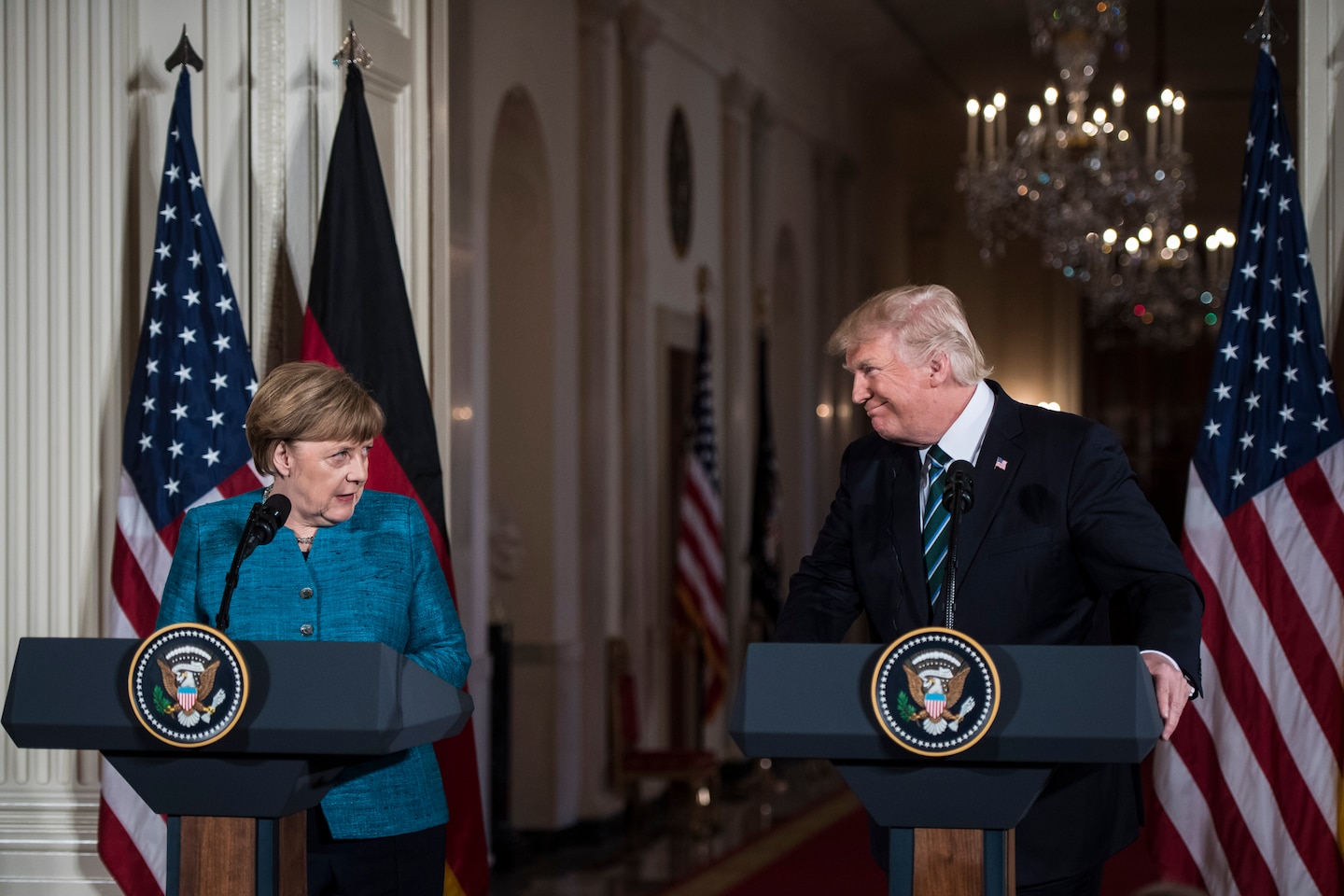Trump, Merkel and the U.S.’s waning global clout

“The image of the U.S. began the new decade in a weaker position globally than at most points in the previous two presidential administrations,” observed the Gallup report, pointing to the corrosive effects of Trump’s brash unilateralism and unvarnished xenophobia on America’s image in the world.
Other recent polling offers further evidence of the trend. According to a Pew survey of respondents in 32 countries, 64 percent of people said they had no confidence in Trump as the United States’ leader. Those grim views are particularly acute in Europe, where Trump’s predecessor Barack Obama was far more popular. A December 2019 YouGov poll in Germany found that Trump was perceived as a greater threat than autocrats in Moscow, Beijing and Pyongyang.
These polls were conducted before the impact of the coronavirus pandemic, which has all the more soured global attitudes toward Trump’s America, site of the world’s single largest death toll and a sprawling, calamitous swath of infections that seemingly has no end in sight.
“People are stunned about the effect of incapable leadership, or of polarizing leadership, of not being able to unify and get the forces aligned so you can address the problem [of the coronavirus],” Thomas Kleine-Brockhoff, a vice president of the German Marshall Fund and director of its Berlin office, said to my colleague Dan Balz. “And that, of course, results in a nosedive in how you view [the United States]. What you’re seeing is a collapse of soft power of America.”
The country with soft power to spare is Germany, which has managed the coronavirus with technocratic efficiency and a degree of unity wholly absent in the United States. “Its response to the pandemic,” wrote Ruchir Sharma, chief global strategist at Morgan Stanley, “has highlighted pre-existing strengths: efficient government, low debt, a reputation for industrial excellence that protects its exports even as global trade falls, and a growing capacity to create domestic tech companies in a world dominated by the American and Chinese internet giants.”
Political leadership is, of course, vital. “When you read the latest results in this report on how the world rates the leadership of major global powers, the leaders who presented the case for the most certainty did the best,” wrote Mohamed Younis, Gallup’s editor in chief. “Longtime German chancellor Angela Merkel, loved or hated, has been one of the most predictable leaders in highly uncertain times in both Europe and the global order.”
That’s all the more true during the pandemic, which has seen Merkel’s domestic popularity surge in the twilight of her political career. “The characteristics that distinguish her have come to the fore in the pandemic, which is measured, facts-based, evidence-based, consensus-oriented leadership,” Constanze Stelzenmüller, a senior fellow at the Brookings Institution, said to my colleague Loveday Morris.
Unlike Trump, she adroitly navigated Germany’s complex federal system, sternly pushing for stricter measures and lockdowns than some local leaders would have contemplated. “Germany wouldn’t have weathered it so well had she not worked very hard at buying the scenery to get all the minister presidents in line,” Stelzenmüller added.
As a consequence, along with the lead role she played in securing a major E.U. budget deal last week, Merkel seems set to depart the political scene with a far rosier legacy than what her critics — including Trump — predicted. “It’s probably a first that after 16 years or 15 years, a chancellor has a chance to ride into a glorious sunset and not into a thunderstorm,” Stefan Kornelius, Merkel’s authorized biographer, told Morris.
The same cannot be said for Trump, whose flailing reelection campaign has collided with a public health disaster. “People close to Trump, many speaking anonymously to share candid discussions and impressions, say the president’s inability to wholly address the crisis is due to his almost pathological unwillingness to admit error; a positive feedback loop of overly rosy assessments and data from advisers and Fox News; and a penchant for magical thinking that prevented him from fully engaging with the pandemic,” my colleagues Philip Rucker and Ashley Parker reported.
“The irony is that if he’d just performed with minimal competence and just mouthed words about national unity, he actually could be in a pretty strong position right now, where the economy is reopening, where jobs are coming back,” Ben Rhodes, a deputy national security adviser to Obama, told them. “And he just could not do it.”
Beyond the pandemic, though, experts see Trump as only the catalyst for a shifting global conversation about U.S. power in the world. “I think the U.S. is seen from my perspective as being involved in its own internal reckoning — like the rest of the world doesn’t really exist,” Robin Niblett, director and chief executive of Chatham House, a think tank in London, said to Balz. “It’s America trying to battle with historical and contemporary demons that as much as anything are a result of its own internal contradictions and tensions and strengths and weaknesses.” He added that Trump represented, simply, a rude awakening.
“Who would ever take that seriously after this?” Matt Duss, foreign policy adviser to Sen. Bernie Sanders (I-Vt.), told the Nation, referring to the United States’ handling of the pandemic. “This idea of America as this unparalleled and supremely competent global hegemon is over.”
Read more:






